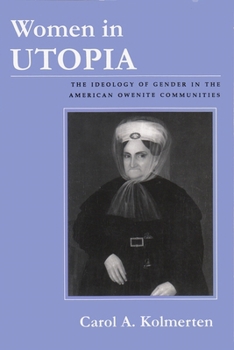Women in Utopia: The Ideology of Gender in the American Owenite Communities
Select Format
Select Condition 
Book Overview
This study contributes to the understanding of Owenism and why it failed. It corrects many of the earlier misconceptions and errors of fact about New Harmony, Indiana, and the seven other Owenite... This description may be from another edition of this product.
Format:Paperback
Language:English
ISBN:0815605552
ISBN13:9780815605553
Release Date:September 1998
Publisher:Syracuse University Press
Length:224 Pages
Weight:0.05 lbs.
Dimensions:0.5" x 6.1" x 9.1"
Customer Reviews
1 rating
Informative analysis
Published by Thriftbooks.com User , 15 years ago
When Robert Owen spoke about equality people responded. Some attacked his ideas, wishing that he had stayed a paternal factory manager duplicating his role at the textile mill in New Lanark, Scotland. There he transformed a typical early 1800's factory into a showcase of benevolence. He shortened the hours for plant workers. He improved the housing and living conditions. He even built a school for infants, the forerunner to kindergartens that are now considered essential to early development. Others responded to his new theory, a total reorganization of society based on equality that culminated in the Utopian commune of New Harmony, Indiana, by moving thousands of miles to be part of it. In the 1820's Owenite societies were springing up all over Britain and the United States. Most of them failed in a few years. The failures were due to poor planning, hardships suffered while trying to build communities from scratch, undelivered promises of equality, and competition with capitalist enterprises. Kolmerten concentrates her research on the promise of equality between the sexes and has uncovered a remarkably rich history of the "woman problem" common to all of the intentional communities of the era. Despite soring rhetoric, the thinking about women's liberation was mired in contemporary understanding of female roles. Woman were promised that they would get equal education and be taught a useful skill, however they were expected to also keep the house, cook the food, be pleasing, and do all of the other domestic drudgery that tied them to the house to begin with. It was the typical "second shift" still expected of working woman today. The contribution of Kolmerten's extensive research, through, no doubt, many giant piles of letters written by women who participated in the Utopian communes, is that the disgruntled feelings of these woman were part of the societies' failure. Some woman came willingly to try the new life, others as appendages of their husbands. Woman of all classes whose experiences were very different, from having servants to being too poor for such luxuries, were now expected to do laundry, cook, clean, and take on another task as well. Some even were denied the right to vote on their own conditions. Because women seldom wrote their own histories, letters are all that's left of their lives and struggles. Kolmerten has distilled the sentiments of personal letters into a important new analysis of what contributed to the failure of the Utopian Socialists. --





